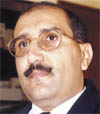Brig. Ali Nassr: “We do not get any assistance from local or foreign organizations, governmental or otherwise.” [Archives:1998/08/Interview]
Staff Brigadier Ali Mohammed Naji Nassr is the Deputy Director of the Military Medical Service and the General Director of the Central General Military Hospital. A graduate of the Military Academy in Egypt and having attended several courses on military medical service, Mr. Nassr previously ran the military hospitals in Taiz and Sanaa. He is currently preparing for a Ph.D. degree in medical statistics and management.
Mr. Nassr talked to Mr. Mohammed Bin Sallam of Yemen Times about several important issues and problems in his field of work. Excerpts:
Q: Could you tell us briefly about the Military Hospital?
A: The General Military Hospital was established in 1964 as an emergency hospital, and was later developed in order to provide better health services for the Yemeni citizens. The hospital now contains a number of diagnosis and treatment departments, except for a maternity and gynecology department, which aim to open in the future. The hospital’s bed capacity now stands at 300 beds, in addition to the out-patient department.
The hospital’s staff consists of a number of highly qualified and experienced Yemeni doctors and surgeons, both specialized and general practitioners. They all carry out their daily duties with high spirit of responsibility towards their patients. The hospital, however, still lacks a number of medical and technical specialties.
Q: What sort of services does the hospital provide?
A: The Military Hospital provides various types of medical and health services for Yemeni citizens, both military and civilian. In his recent directives, President Ali Abdullah Saleh – Commander-in-Chief of the Armed Forces – emphasized that the Military Hospital should provide health services for all civilian patients without exception. So now three out of every four patients treated at the hospital are civilian.
Q: Do patients have to pay fees in return for the treatment they receive?
A: Military personnel and members of their families, as specified by the Military Service Law, are treated free of charge. Small token fees are paid by civilian patients in return for the more costly diagnostic services.
Q: Where do you get the necessary medicines from?
A: The Military Hospital gets its medicines and other medical supplies from the Ministry of Defense, which in turn buys them through an annual public tender. There is some form of cooperation with the Ministry of Health in certain fields, but up to now there is no actual implementation of that ministry’s proposed support for the Military Hospital. We only got promises.
Q: Are these medicines provided to patients free of charge?
A: Despite severe shortages in medications, military personnel, their families and even civilians are given the available medicines free of charge. As for hospitalized patients, all medicines are provided free of charge. Those that are not available in the hospital are bought from the outside and given to the hospitalized patients free of charge, as well.
Q: What about daily meals?
A: Meals are also free. Of course, they are provided to the patients according to their specific cases of illness and as the doctors recommend. We try our best to provide well-balanced, healthy meals despite the shortages experienced in some types of food stuffs.
Q: Are your doctors able to deal with all cases that come to your hospital?
A: Due to the lack in some modern and sophisticated diagnostic medical equipment, some patients with malignant or serious illnesses are sent abroad. Such cases include cancerous tumors, heart diseases, organ transplants, etc. There is a great deal of cooperation with other hospitals inside Yemen and abroad.
With more attention by the government in providing the necessary diagnostic and treatment facilities, better qualifying the medical staff through good training courses, I believe we will no longer need to send patients for medical treatment abroad, except maybe in some very serious and advanced cases.
Q: What services do you provide for disabled war veterans?
A: Many types of health services, including food and accommodation, are provided for disabled war veterans. The out-patient department supervises their health and general well-being. Some necessary facilities are still lacking, but we hope that these will be available in the near future.
Q: Do you receive any aid and assistance from local or foreign organizations?
A: Outside assistance is virtually non-existent, despite the large number of civilian patients we see every day. Although there is a marked lack in medicines and medical supplies, we still do not get any form of assistance from local and foreign organizations, governmental or otherwise. Local and foreign charities and aid organizations have largely kept away. We certainly need a lot of support and assistance.
I’d like to seize this opportunity to call through Yemen Times on all international governmental and non-governmental organizations and charities to extend their help by assisting the Military Hospital, which is helping large numbers of Yemeni citizens. We are willing to receive all sorts of support and facilitate the cooperation with other organizations.
Q: What sort of difficulties do you face in your work?
A: Despite the modest facilities at the Military Hospital, our doctors nurses, and technicians try their best to provide the patients. military and civilian alike, with all possible care and attention.
We face many daily problems, the most pressing of which is the increase in patient numbers, especially civilians whose numbers are beyond the capacity of our hospital. Other difficulties include work hindrances caused by the out-patient department.
Sometimes, critical operations are disrupted when there is a power cut. The available auxiliary electric generator does not have the required capacity. Ambulances and other essential means of transportation are also lacking.
Q: Do other military hospitals in Yemen provide the same services as your hospital?
A: Other military hospitals in Yemen vary in their capacities, facilities, and type of service provided. The Military Hospital in Sanaa is considered the base of military health services in Yemen. It often provides many types of assistance to other hospitals by supplying them with doctors, nurses, and medical technicians. So really this hospital is the nucleus and the center for any future developments in the military health service sector in Yemen.
Q: Do you have any plans for the future expansion and development of the Military Hospital?
A: We are very optimistic about the future, egged on by the responsibility to provide our servicemen and ordinary civilians with the best medical care available.
Our development plans include;
– providing modern and sophisticated medical diagnostic equipment;
– training and qualifying a medical and technical staff capable of operating such equipment;
– providing the necessary engineers and technicians to do the necessary maintenance of these equipment;
– building modern out-patient departments to relieve the hospital of some of the present work load; and
– establishing new departments to satisfy the increasing demands and keep up with the rapid developments in health care.
We have also submitted a proposal to establish a specialized modern military health center, which will also be a doctor and medical student training center. Unfortunately, up to this point in time, we have not received any response regarding this proposal. I think lack of essential facilities and resources are to blame.
Q: Do you have any last comment?
A: I’d like to call on international, regional and local governmental and non-governmental organizations and charities to assist with our efforts.
I’d like to thank all the staff at the Military Hospital on their great efforts and constant hard work. I hope the relevant authorities will improve the health staff living standards and remove all obstacles they face in their professional life.
——
[archive-e:08-v:1998-y:1998-d:1998-02-23-p:./1998/iss08/intrview.htm]


